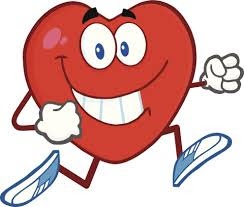 Happy head, happy heart: Positive emotions may promote heart-healthy behaviors
Happy head, happy heart: Positive emotions may promote heart-healthy behaviors
Happy head, happy heart: Positive emotions may promote heart-healthy behaviors – What do you think of this article by NIMH?
“People with heart disease may benefit from maintaining positive emotions, according to health researchers. Over the course of five years the researchers tracked more than 1,000 patients with coronary heart disease. Patients who reported higher positive psychological states were more likely to be physically active, sleep better and take their heart medications and were also less likely to smoke, compared to patients with lower levels of positive states.
“Negative emotions and depression are known to have harmful effects on health, but it is less clear how positive emotions might be health-protective,” said Nancy L. Sin, postdoctoral fellow in the Center for Healthy Aging and in the department of biobehavioral health at Penn State. “We found that positive emotions are associated with a range of long-term health habits, which are important for reducing the risk of future heart problems and death.” The researchers assessed psychological well-being of participants at baseline and again at a five-year follow-up by asking the participants to rate the extent that they had felt 10 specified positive emotions, including “interested,” “proud,” “enthusiastic” and “inspired.”
Physical activity, sleep quality, medication adherence and alcohol and cigarette use were also measured at baseline and again five years later. The researchers report their findings in the today’s (Oct. 2) issue of the journal Psychosomatic Medicine. “Higher levels of positive emotions were associated with less smoking, greater physical activity, better sleep quality and more adherence to medications” at baseline, said the researchers. They found no correlation between positive emotions and alcohol use.
The results took into account patients’ demographic factors, depressive symptoms and the severity of their heart conditions. Though positive emotions at baseline did not predict changes in health behaviors five years later, increases in positive emotions across the five-year period were associated with improvements in physical activity, sleep quality and medication adherence. There are a number of reasons why positive emotions are linked to optimal health habits, the researchers suggest.
People with greater positive well-being may be more motivated and persistent in engaging in healthy behaviors. They might have more confidence in their abilities to maintain routines such as physical activity and sleep hygiene. Positive emotions may also enable people to better adjust their health goals and to proactively cope with stress and setbacks. “Efforts to sustain or enhance positive emotions may be promising for promoting better health behaviors,” said the researchers. This research sets the stage for future work on interventions to improve health habits, Sin noted.
Further research with other chronic disease populations and with electronic tracking of health behaviors should be conducted, she said.
Judith Tedlie Moskowitz, professor, medical social sciences at the Feinberg School of Medicine, Northwestern University, and Mary A. Whooley, professor, medicine, epidemiology and biostatistics at the University of California San Francisco and physician at the San Francisco Veterans Affairs Medical Center, also worked on this research.
The National Institute on Aging, the National Institute of Mental Health, the department of Veterans Affairs, the National Heart, Lung and Blood Institute, the Robert Wood Johnson Foundation and the American Federation for Aging Research supported this work.
Disclaimer: AAAS and EurekAlert! are not responsible for the accuracy of news releases posted to EurekAlert! by contributing institutions or for the use of any information through the EurekAlert system.”
For more on this and other mental health subjects, please visit our course listing page Continuing Education Online Courses
Want more information on emotions and the tie to heart-healthy behaviors, then click here.

 Happy head, happy heart: Positive emotions may promote heart-healthy behaviors
Happy head, happy heart: Positive emotions may promote heart-healthy behaviors